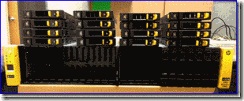
Happy to report that last night I passed the EMC 20-001 (ISM) exam to earn the EMCISA designation. Preparing for the exam was a blast so I figured I would share some of my thoughts and give some feedback. First, this exam does not focus on any one product and maintains vender neutrality most of the time which was a huge plus as I normally work with other storage vendors. It’s safe to say that this is the “CCNA” of Storage. However, you can expect to learn a lot about EMC’s offerings which includes the following: {HARDWARE} Clariion (SAN), Symmetrix (SAN), Celerra (NAS), Centera (CAS), Connectrix (Fabric) {SOFTWARE} Avamar, Mirrorview, SRDF, Navisphere etc. On top of that you will become intimately involved with everything related to a storage infrastructure including everything from the mechanics of hard drives , protocols such as iFCP, FCOE, iSCSI, SCSI, and FC. Plus, business continuity, security, monitoring, and information lifecycle management. Also, learning about Content Addressable Storage, which is how many of the archiving system work was highly valuable to me. This section helped me “connect the dots” since I deploy archiving systems but never really knew what was going on under the hood with the file system.
EMC’s “Information Storage and Management” book was a huge help and is a “must have” in passing this test. I’d say that passing the exam without reading this book cover to cover would be very difficult to achieve a passing score. When I needed more information a quick google would be sufficient but the book seems to be enough an provides much detail. Overall, it was a a very fun experience and even though I consider myself pretty advanced on storage I learned a great deal from this exam. I feel that this exam should be on top of any IT Professional’s list regardless of which vendor they use as virtualization and cloud technologies continue to grow and understanding the storage side is critical since it is the blood of an infrastructure.
Below is the official summary of topics that are covered. It is a broad list so I would recommend looking at the table of contents of the ISM book to get a better idea on specifics.
• Storage Systems
o Data classification and storage evolution
o Core elements of a data center infrastructure and their requirements o Importance and benefit of ILM strategy
o Physical and logical components of the host, connectivity and storage, including key protocols and options
o Components of a disk drive, including their functions, logical constructs of a physical disk and factors affecting disk drive performance
o Common RAID levels; appropriate RAID levels based on performance and availability considerations
o Components and benefits of an intelligent storage system
• Storage Networking Technologies and Virtualization
o Direct-Attached Storage (DAS) benefits, limitations, and management considerations
o SCSI architecture and addressing scheme
o Storage Area Network (SAN) including the benefits, best environment for SAN use, SAN components, topologies, connectivity options and zoning
o FC protocol stack, addressing, flow control, and classes of service
o Networked-Attached Storage (NAS) including benefits and best environment for NAS use, NAS components, protocols, implementation options, and management considerations
o IP Storage Area Network (IP SAN) including benefits and best environment for IP SAN use
o Basic architecture of iSCSI, FCIP and FCoE
o Content Addressed Storage (CAS) including benefits and best environment for CAS use, CAS elements, storage, and retrieval processes
o Block-level and file-level storage virtualization technology and the concepts of virtual provisioning and cloud computing
• Business Continuity
o Business Continuity measurement, terminologies, and planning
o Backup consideration, purposes, and granularity o Backup methods, architecture, topologies, and technologies in SAN and NAS environments
o Local replication: uses, considerations, including host and array-based local replication technologies
o Synchronous and asynchronous remote replication, including various host and array-based remote replication technologies
• Storage Security and Management
o Storage security framework and various security domains
o Security implementation in SAN, NAS, and IP-SAN networking
o Monitoring various storage infrastructure components
o Storage management activities, challenges, and storage management initiative





4 Comments
Hi Justin,
I came across your post, and would appreciate some guidance. If I would like to specialise in stroage and haven’t got a clue about storage would you recommend this course as a starting point?
Thanks
Hi Rehman, thanks for reading. I honestly think that the EMC book I speak about in this post would be the best starting point for you. It will teach you everything you need to know about storage from soup to nuts. It is also easy for a beginner to follow. Get the book and come back to me to let me know what you think.
Hi Justin,
I am basically a fresher and recently joined a company where i am put into a project which involves working on storage.
Within a few weeks i got pretty much interested in the technology and wanted to learn more , and luckily i got to know about this book. I would definitely say that this book helps in clearing all are concepts on storage.
I want to know what further steps i should take to specilize in the same field?
Thanks!!!!!
Another great book is by Mostafa Khalil form VMware. See the link – http://www.amazon.com/Storage-Implementation-vSphere-VMware-Press/dp/0321799933/ref=sr_1_1?ie=UTF8&qid=1372810066&sr=8-1&keywords=mostafa+khalil
Comments are closed.